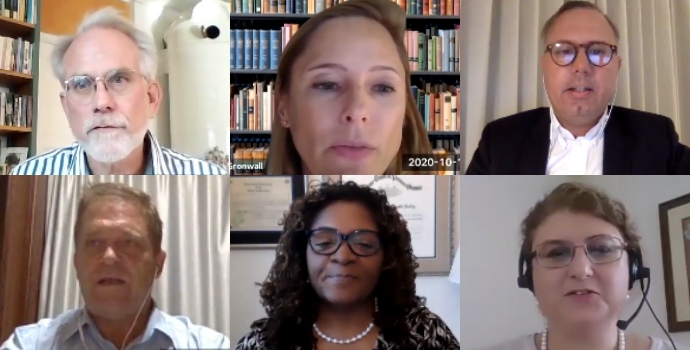- About Us
-
Who we are
-
- Publications
-
- ADPC Academy
-
MediaADPC'S NEWS
Discussing the combined impacts of climate crises and COVID-19 Discussing the combined impacts of climate crises and COVID-19
6 Nov 2020
Stockholm, Sweden

Webinar participants discussing the combined impacts of extreme weather and COVID-19 on communities globally.
The impacts of hydrological disasters like typhoons, floods and droughts on communities are exacerbated by the COVID-19 pandemic. Access to water and sanitation are top government priorities to protect public health in emergencies and authorities are expected to share critical information and ensure governance during disaster response and recovery.
The Stockholm International Water Institute (SIWI) organized a webinar on 'Climate Crises and COVID-19 Collide: Resilience through Information, Governance, and Justice’ as part of World Water Week 2020 to discuss the impacts of extreme weather events and COVID-19 on communities and how information, governance and justice initiatives work together to address multiple crises.
The webinar was moderated by Dr. Phil Graham, International Programme Manager for Water and Climate at the Swedish Meteorological and Hydrological Institute (SMHI) and invited panelists worldwide.

Mr. Hans Guttman, Executive Director of Asian Disaster Preparedness Center (ADPC), presenting at the webinar.
Mr. Hans Guttman, Executive Director of Asian Disaster Preparedness Center (ADPC), was invited to present on the importance of human rights, governance and fairness during disasters. Mr. Guttman explained that disasters can prevent people from reaching their potential in terms of well-being and sustainability.
“Asia has 80% of the world’s population who are exposed to floods,” he said adding that the climate change is making floods more frequent.
Mr. Guttman identified that both disasters and pandemics impact livelihoods and access to health, so adopting a human rights approach helps authorities prioritize people’s needs. “It drives the thinking to focus on outcomes for the affected populations,” he said. “It requires participation in the development of protective measures and responses.”
Mr. Guttman also outlined how emergency contexts impact governance. He explained that decision-making during disasters and pandemics requires inputs both from experts and elected officials. “Social and cultural circumstances, as well as past experiences are critical in shaping the most effective system,” he suggested.
Lastly, Mr. Guttman discussed fair access to disaster and climate information. Mr. Guttman referred to an early-warning systems project in Viet Nam implemented by ADPC to explain that authorities should share climate data with farmers whose livelihoods are adversely affected by climate change.
“We can cross the bridge between science and policy or Earth observation data and the village if different stakeholders are more directly able to access the climate data,” he added.
Other panelists included Dr. Jenny Grönwall, Advisor on Water Policy and Rights at SIWI, Dr. Oliver C. Ruppel, Director of the Development and Rule of Law Programme at Stellenbosch University (SU), Dr. Adrienne Hollis, Senior Climate Justice and Health Scientist at Union of Concerned Scientists and Ms. Carol Chouchani Cherfane, Chief of Water Resources Section at United Nations Economic and Social Commission for Western Asia (UN ESCWA).
Watch the full webinar below:
Latest NewsRelated Trainings
-